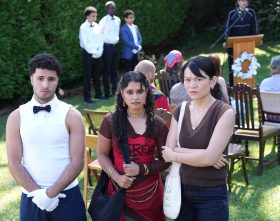An air of earnest outrage radiates from Travis Fine’s Any Day Now, the attitudes displayed and injustices waged inspiring anger and incredulity. As two men – Assistant District Attorney, Paul Fliger, (Garret Dillahunt, 12 Years a Slave) and female impersonator, Rudy Donatello, (Alan Cumming, TV’s The Good Wife) – embark upon a bid for adoption, the difficulties and discrimination they face defies logic. As gay men endeavouring to care for Marco (debutant Isaac Leyva), the Down Syndrome-afflicted 14-year-old son of Rudy’s incarcerated, neglectful neighbour, Marianna, (Jamie Anne Allman, The Killing), all they are met with is condemnation and derision.
Signalled by its period wardrobe and free-flowing hairstyles, Any Day Now is set in California 1979, when homosexuality was seen as unwelcome behaviour; of course, modern correlations abound. Paul and Rudy meet at a gay bar, in an obvious case of opposites attracting; where the former is reticent about disclosing the nature of their relationship, the latter strenuously declines to hide from the world. Marco’s involvement in their lives is an unexpected development, but one that the fledgling couple takes to with aplomb. After a year of idyllic family life, their unconventional arrangement attracts scorn and scrutiny. Pleading their case in the courts, it is their sexual orientation that monopolises discussion, not the best interests of the child.
Making his third feature after The Others and The Space Between, actor-turned-filmmaker Fine combines the intimate and the expansive in his poignant effort. As co-written with animation and comedy veteran, George Arthur Bloom, (The Magic School Bus), his film tells of personal circumstances and societal repercussions, of emotions and issues. Though an evident melodrama in its heart-rending antics, the feature’s depiction of its against-the-odds tragedy is as assured as it is overt, and as finessed in intention as it is blunt in execution. Subdued aesthetics aid in the balance, controlled colours and composition tempering the derivation in the assemblage of standard plot points. The inclusion of musical interludes, sung with gusto by Cumming, adds resonance.
Any Day Now doesn’t tread any new ground in its exploration of prejudice and its examination of custody battles, nor in its eliciting of a strong reaction; however, what sets it apart is its stellar performances. Again, the evocation of sentiment is inescapable, yet is grounded in portrayals that eschew stereotypes. Paul may be overcoming his closeted past, but is believable in his quest for acceptance. Rudy’s insistence that his proclivity for dressing up in drag and his nurturing instincts aren’t mutually exclusive is tender and thoughtful. Marco’s desire for a happy ending and a place to belong illustrates the film at its most moving, as does the feature’s refusal to take the expected path.
Ensconced in fine support work by Kelli Williams (Army Wives) and Frances Fisher (The Congress), all three lead characters, though broadly painted in story, become nuanced in their casting. Dillahunt plays it serious but never wavers in his underlying affection, his performance a subtle showing of restraint and determination. First-timer Leyva is given less room to move and less detail to enliven, yet engages in his honesty – but the film belongs to the fearless Cumming in perhaps his finest work in a lengthy career. Inconsistent Brooklyn accent aside, to watch him transcend categorisation and intertwine the competing aspects of a complex personality is to witness a layered demonstration of strength and compassion. Ire arises from his surrounding circumstances, but empathy emanates from his emblematic display, and from a film that is never anything less than impassioned.
Rating: 3 ½ out of 5 stars
Any Day Now
Director: Travis Fine
US, 2012, 98 mins
Mardi Gras Film Festival
13 – 23 February
Melbourne Queer Film Festival
13 – 24 March
Actors:
Director:
Format:
Country:
Release:





